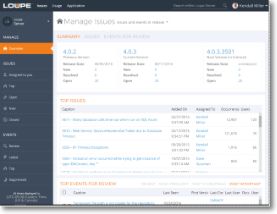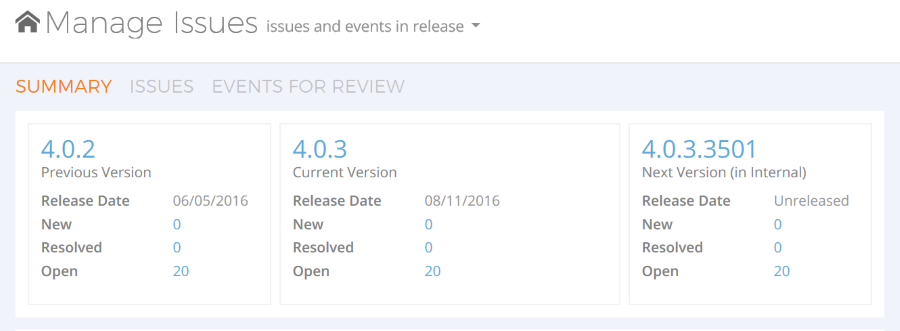Getting Started
When you drill into an application from the Loupe Resolve dashboard, click the Issues button on the top of the screen, or select the Overview option from the issues subnavigation you'll be presented with the Issues Overview page

Issue Overview Page |
This view presents an "at a glance" understanding of what known problems (Issues) you should look at and what new problems (Events for Review) deserve your attention, while never overwhelming you with a sea of data that you can't digest or make a difference with.
Selecting Your Perspective - Choosing a Release Type
Loupe assigns every version of your application a Release Type which indicates how far that release has been promoted through your development process. The list of release types can be customized to suit your team's process, but by default it is:
- Internal (Default) - A version that is only used by the development team and not provided to external users.
- Beta - A version that was provided to a limited set of external users that is incomplete and not published for everyone. Typically betas are only support for a short period of time.
- Release - A version that was published to external users and will have longer term support.
If you're an internal development team you may want to modify this list to fit your process - perhaps for you the best progression is Internal, QA, Certification, and Production. You can freely change the list of release types as long as the order is correct since that shows Loupe which versions are more important than others.
Depending on the role you're concerned about at the moment pick the corresponding release type to view information tailored to your situation. For example, if you are concerned only about what's happened to software that's been shipped and running in the wild pick Release (the default). This will then show you the previous release version, current release version, and the latest version in development that could be promoted to Release

From this you can:
- Compare the current release to the previous release to see if you're on par, worse, or improving.
- Understand what the reliability implications would be of releasing the latest version.
- See just the most important events to review that affect your released versions, ignoring development noise.
You can also drill into the specific issues behind each of the metrics for new, resolved, and open issues.
Reviewing Important Events
Once you’ve picked the right perspective for your situation, the top events for review will list those unique, untriaged errors, affecting the current version ordered by their severity and occurrence. The Summary tab shows the most important ones - if you'd like to see a more complete list of relevant events select the Events tab.
For more information on how to quickly and effectively review events, see User's Guide - Resolve - Triaging Events.